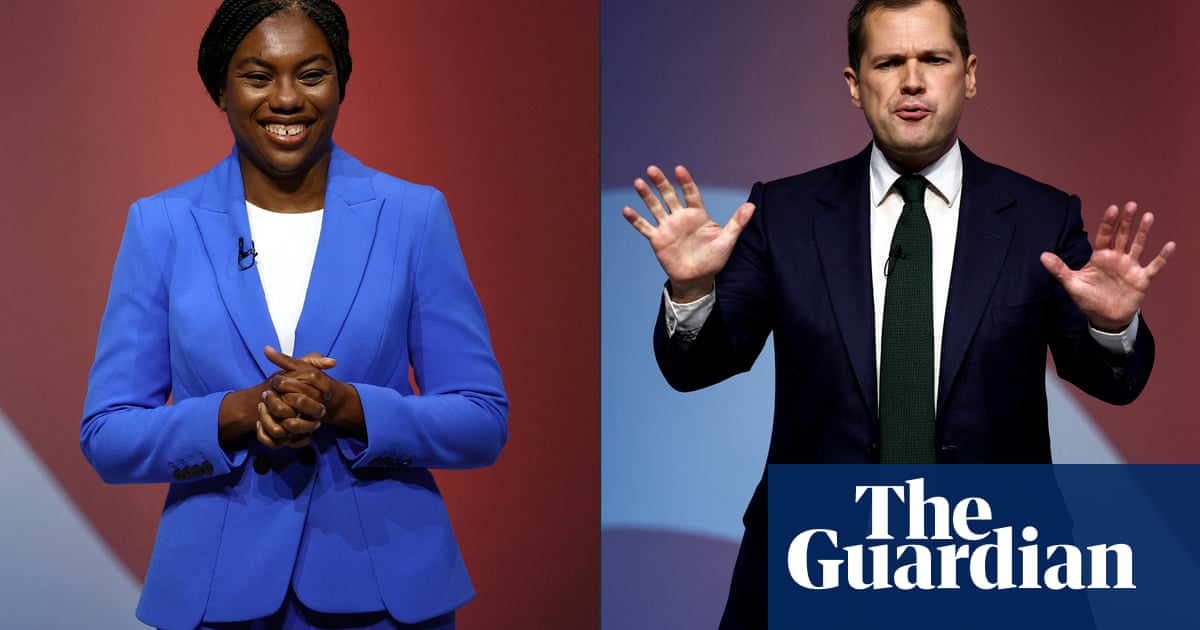Senior Conservatives have warned that the party could split if Kemi Badenoch or Robert Jenrick pursue an overtly populist path as leader, after the party’s main centrist group refused to endorse either candidate.
With moderate Tories still reeling from the shock ejection of James Cleverly from the contest, leaving a choice of two MPs firmly on the party’s right, shadow ministers and Tory MPs urged the pair to not overly focus on chasing Reform voters.
As one Conservative centrist described the party’s position as “bleak”, the Tory Reform Group (TRG), which represents many one-nation Conservatives, said it could not endorse either Badenoch or Jenrick.
“Both have used rhetoric and focused on issues which are far and away from the party at its best,” it said in a statement, adding that the group had also been “consistently disappointed by the lack of engagement from the two candidates chosen by MPs”.
There is particular worry among some Conservatives that Jenrick’s promise to immediately pull the UK out of the European convention on human rights (ECHR) so as to be able to expel asylum seekers, a plan he reiterated in a speech on Thursday, could divide Conservative MPs.
Answering questions afterwards, Jenrick insisted his campaign “represents all the traditions of our party”, with support from some centrist Tories such as Victoria Atkins, one of the TRG’s patrons.
But with the speech couching membership of the ECHR in categorical, Brexit-echoing terms of “leave or remain”, some Tories doubt his ability to unify the party.
On Thursday evening, Jenrick said any of his shadow ministers would need to back this. “I want to have a broad church, but you’ve got to have a common creed,” he told The Sun’s YouTube show Never Mind the Ballots.
“Of course the party could split over the ECHR,” said Steve Baker, the former minister who is backing Badenoch in the contest. “And trying to carry MPs by force of character or authority is a mistake which belongs in the past.”
There are also concerns that a pitch to voters aimed mainly at countering Reform UK over immigration or culture wars could repel former Conservative voters who defected to the Liberal Democrats in large numbers in July’s election.
These worries also take in Badenoch, who while less doctrinaire on migration – she has argued that leaving the ECHR is an over-simple solution – has railed against what she calls a growth-stifling bureaucratic elite, arguing at last week’s Tory conference that up to 10% of civil servants are so bad they should be in prison.
One backbencher said they had been dismayed at the final two candidates, whittled down from an initial six by a series of votes among Tory MPs, with party members now picking a winner in a postal ballot, with the result announced on 2 November.
“The sound you can hear in the background is the barrel being scraped,” they said. “We have a choice of an ECHR one-trick pony, who believes our special forces murder people, and an anti-woke one-trick pony who picks endless fights. As a choice, it’s shit.
“If they make the Liz Truss mistake of packing their frontbench with supporters, rather than reaching out to the wider party, then there really could be a split.”
One former minister said: “Really, this is all a consequence of Rishi’s disastrous election. The tiny electorate, many of them incredibly inexperienced, meant tiny margins could make huge differences.
after newsletter promotion
“Hopefully, there will be more gaffes to show people the difference between the candidates, so we at least get the least bad option. But it’s all very bleak.”
Liam Walker, an Oxfordshire councillor and campaign manager for the party in Witney, the once ultra-safe Tory seat represented by David Cameron that was lost to the Liberal Democrats in July, said he hoped Jenrick and Badenoch would not just try to occupy Reform territory.
“I am a bit concerned,” he said. “The centre ground is where we win elections, and it’s where we managed to more or less wipe out the Lib Dems here in the past. This feels like a lurch to the right. Immigration is an issue among voters here but it’s fair to say that leaving the ECHR isn’t really something that comes up on the doorstep.”
Some centrist Tories believe Badenoch, who spent the day campaigning in a council byelection, has not boxed herself in quite so much with specific policy promises, and so could be better placed to ease their concerns.
Another former minister said: “If Kemi now speaks out on housing, health and the economy, which are the most salient issues affecting people and on which she has much positive to say, then that will do a lot to help persuade members who fear a mad lurch to the right.”
For now, many Conservative MPs who backed Cleverly or the other main centrist candidate, Tom Tugendhat, or who just have doubts about the two remaining contenders, are watching, waiting and hoping for the best.
“I think everyone gets the enormity of what we’ve been through with the election defeat, and a smart candidate won’t want to split the party,” one shadow minister said. “They’ll be aware of the different opinions on things like the ECHR and culture wars. They’ll also be aware that, with 121 MPs, we just haven’t got the numbers to start splitting into factions.”
In an apparent effort to shore up the new leader, the percentage of Tory MPs required to trigger a challenge has been doubled from 15% to 30%, it was announced on Thursday evening. Under the previous rules, just 18 MPs could have begun this process, given the current contingent of 121.












